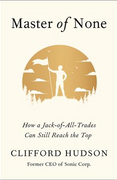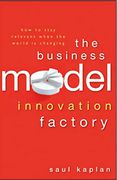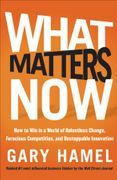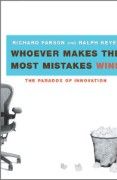
A 5 Minute Overview Of
Master of None
How a Jack-Of-All-Trades Can Still Reach the Top
About the Author
Clifford Hudson is the former chairman and CEO of Sonic Corp. which operates more than 3,490 restaurants located in 46 U.S. states. During his tenure as CEO, Sonic's sales grew from $861 million to $4.5 billion. Clifford Hudson is an attorney, served as a member of the Corporate & Securities Practice Group, and as chairman of the Board of Directors of the Securities Investor Protection Corporation (SIPC) from 1994 to 2001, a presidential appointment. He is also a past chairman of the Board of Trustees of the National Trust for Historic Preservation. Clifford Hudson is a graduate of the University of Oklahoma, and Georgetown University Law Center.
The Main Idea
Are you better off being an expert in one field or a jack-of-all-trades when it comes to business?

Ever since Malcolm Gladwell published Outliers in 2008, the "10,000-Hour Rule" has ruled supreme. Gladwell suggested that to become an expert or world-class performer in any field, you had to commit to 10,000 hours of deliberate practice — roughly about three hours of focused practice every day for a decade — before you became an expert.
That's all well and good, but assuming you endure the shear monotony of that, what happens if you spend 10,000 hours getting really good at some business skill that then becomes obsolete? Is mastery really better, or should you put a higher premium on being adaptable enough to do a little bit of everything, and then pivot as interesting opportunities arise?
I'm sure it's gratifying to be the best or even considered among the best at something. But focusing too narrowly comes with its own risks — perhaps even more in today's technology-driven environment, which constantly changes the nature of work and the skills required. Overinvesting in expertise is often riskier than learning to be adaptive and in an always-learning mode. I don't know about you, but I've chosen to go through life experiencing as much as I can and becoming good enough to be successful in a variety of endeavors. That phrase "good enough" might not sit well with you, but when you evaluate the actual benefits of exactitude, you might find, as I have, that becoming good enough to be broadly successful is a better and far more rewarding experience. Variety isn't just the spice of life; it's an untapped strategy for succeeding sooner and in more ways than one.
Sections in this Books
1. Rule #1 — Stability is a myth: Change is a constant. Expertise is great because it seems to offer stability, but it's a myth. Change is going to be always with us, so you're far better off being prepared for change by being nimble.
2. Rule #2 — You achieve more if you're not in control. Control is an illusion. The best way to achieve more is to surround yourself with people who know more than you do. Don't sit back and issue orders. Ask people for their best ideas, and do that.
3. Rule #3 — Harmony requires contrast and many voices. Always allow your people to work individually but operate collectively. There's nothing finer than finding a way to blend people's talents together to come up with things that are mutually beneficial.
4. Rule #4 — Say "Yes" and figure it out as you go along. Generalists say "Yes" to every opportunity that comes along. They then scramble to figure things out, and turn opportunities into benefits. Make it your habit to do the same.
5. Rule #5 — Seize the opportunities created by others. Leaning on your own abilities is fine, but you should also seize the opportunities others create as well. Do see the big picture, and then be prepared for anything and everything.
6. Rule #6 — Focus is good but you also must innovate. Making your business run better is worthwhile, but you also have to add new ideas as well. Never lose sight of the fact you need to innovate all the time to grow.
7. Rule #7 — Don't link your identity to your label. Everyone in your organization (including you) with have a job title, but teach them to embrace "and" as well. Don't let labels constrain your thinking. Let everyone innovate,
8. Rule #8 — Only a win-win approach sustains growth. Servant leadership — where the leader is the least important person in the team — works incredibly well. Make sure it leads to win-win outcomes that benefit everyone.
9. Rule #9 — Embrace options not of your own choosing. Always look at change as good, even if the change is imposed from the outside. You never know what new heights you can reach when freed from your present concerns and worries.
10. Rule #10 — Mastery is fine, but it's not 100% necessary. Be proud of the master of none badge. "Variety is life's multiplier of opportunity."
Key Takeaways
- Focusing too narrowly on anything is risky in today's technology-driven markets. You're far better off to become good enough to be successful in a variety of fields, and to stay in always-learning mode.
- Mastery of any field is fine, but it's not 100% necessary. Be broadly successful, not a one-trick pony.
I can’t write your perfect script for success. Nobody can. But I can tell you that there are more opportunities for success and happiness available to those who are willing to loosen the reins and let themselves wander down many paths. Variety isn’t just the spice of life; it’s an untapped strategy for succeeding sooner and in more ways than one.
Summaries.Com Editor's Comments
Have you ever been accused of being a "Jack of all trades, Master of none?" Sometimes that is meant as an insult, but ex-CEO of Sonic Corp. Clifford Hudson suggests this is the ultimate compliment someone can pay you. If that describes your approach to business, he thinks you're on the right track. I agree. It's much more fun to try and dabble in lots of different fields than it is to grind away getting in your 10,000 hours of deliberate practice first.
I have always liked the definitive Niels Bohr quote when he said: "Prediction is very difficult, especially if it's about the future." It stands to reason that in an environment like you get today, being a generalist or a jack-of-all-trades is a good thing. It gives you options, as one technology or another comes to the fore, or as one industry gains ascendancy over another. Pure and simple, being quick on your feet is much better than overinvesting in some expertise that ends up being rendered obsolete by a new technology or change in the marketplace.
Here's to being a jack-of-all-trades but a master-of-none. Become "good enough" to excel in a lot of different fields. At the very least, you'll have an adventure. That's a pretty good outcome in and of itself.
Want in-depth 30-minute summaries?
In addition to this 5-minute overview, Summaries.Com has a premium 30-minute summary of this book and 1,000+ more, to help you advance your career and business.
Check Out Summaries.com Premium Plans Today!Want more 5-minute Snapshots?
To get a new 5-minute business book snapshot each week, sign up for the Summaries.com free plan.
Sign Up for the Summaries.com Free PlanDigital Disruption 101 Collection
If you enjoyed this summary, here is a collection of related business book summaries, to help you get ideas and strategies that will give you an edge over your competition.
This mini-course will give you ideas on how to excel in changing and disruptive markets.
Buy Digital Disruption 101 Collection (5 x 30-Min Summaries)
Master of None
How a Jack-Of-All-Trades Can Still Reach the Top
by Clifford Hudson

The Business Model Innovation Factory
How to Stay Relevant When the World Is Changing
by Saul Kaplan

Digital Disruption
Unleashing the Next Wave of Innovation
by James McQuivey

What Matters Now
How to Win in a World of Relentless Change, Ferocious Competition, and Unstoppable Innovation
by Gary Hamel

Whoever Makes the Most Mistakes Wins
The Paradox of Innovation
by Richard Farson and Ralph Keyes